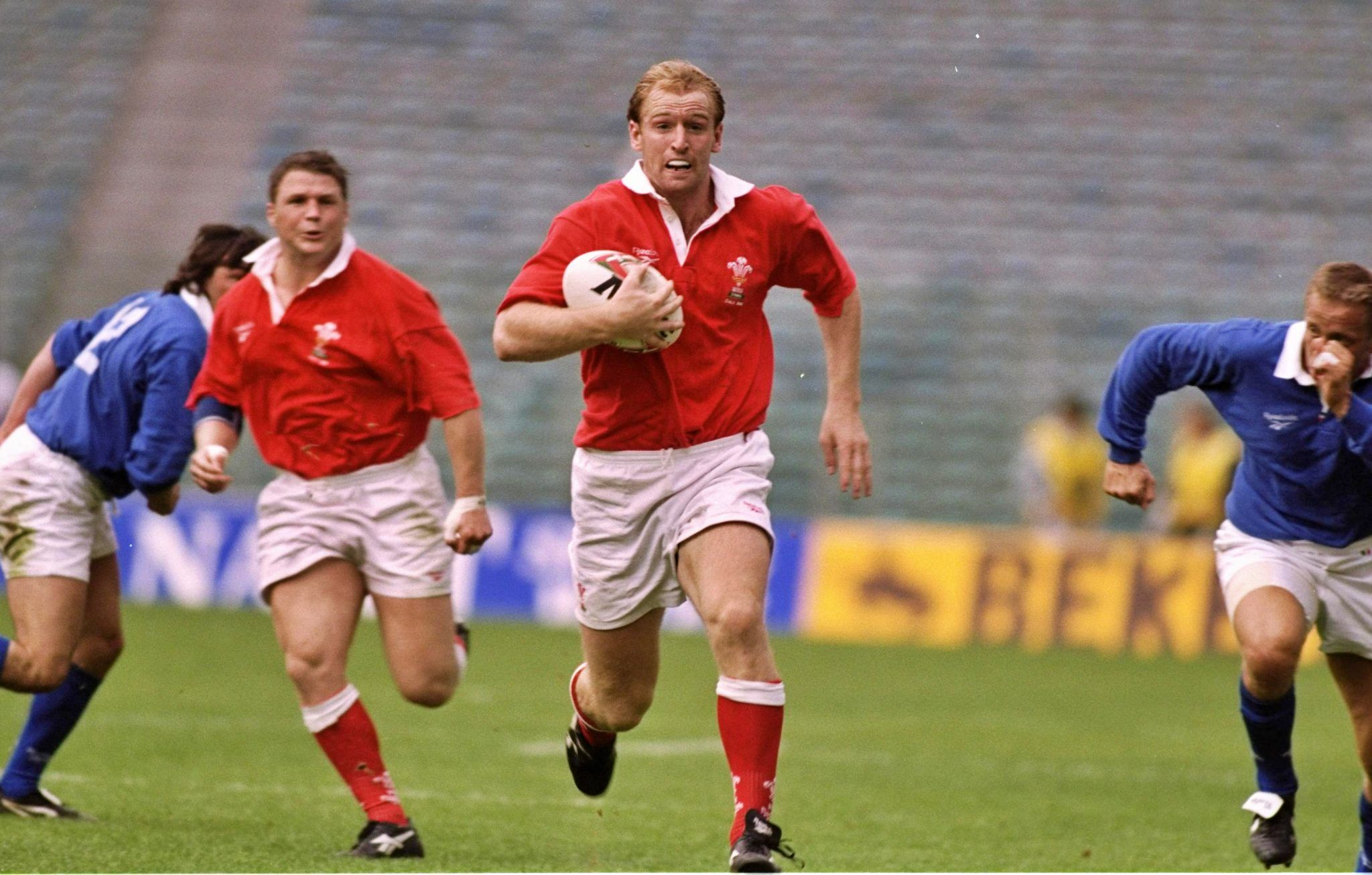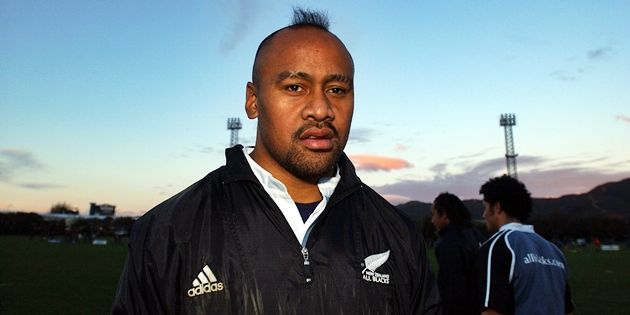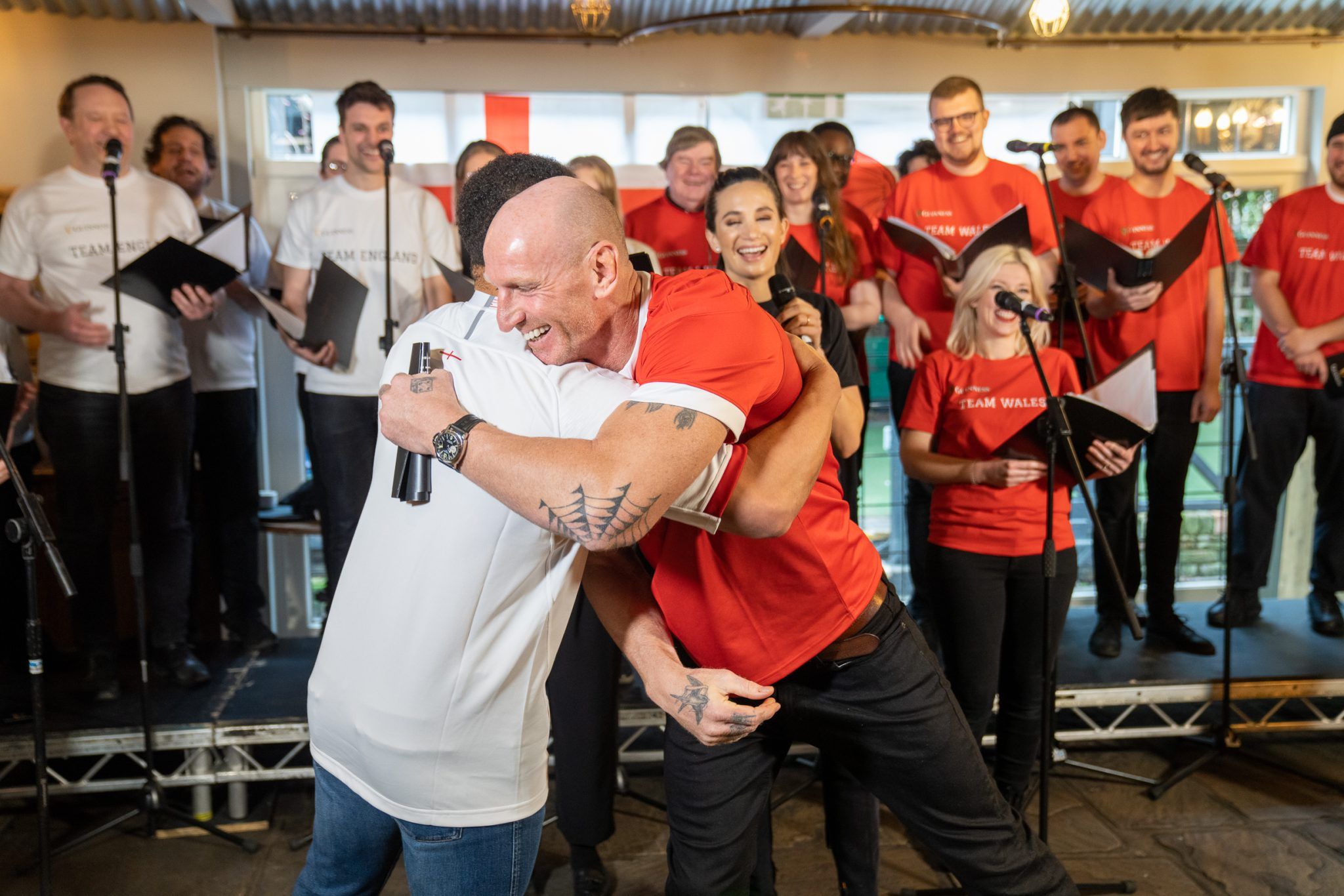

Share
19th March 2020
08:37pm GMT

"I broke into the national team after these East Wales vs. West Wales games. When the game went pro, they had a thing in Wales where you had to spend a year of rugby at the club that brought you through at youth level. That was your pay-back to the club. "So I spent a year playing with Pencoed and I learned more about rugby, with them, in that year than I did anywhere else in my life. They had neutral touch judges - one from each side running the line - so a lot of stuff would be missed, or ignored. You lose concentration for even a second and you'd be on your arse. Someone would give you a wallop.""I moved on then and played about 20 games for Bridgend," he continues, "about three-quarters of a season. I impressed in those East vs. West trials and was brought in for Wales training. I was still working as a post-man when I played for Wales."
 Thomas scored a hat-trick against Japan on his Test debut, in the 1995 World Cup in South Africa. If life at the very top seemed too simple, New Zealand would bring him back to earth in Wales' next pool game.
Thomas scored a hat-trick against Japan on his Test debut, in the 1995 World Cup in South Africa. If life at the very top seemed too simple, New Zealand would bring him back to earth in Wales' next pool game.
"It's not playing agains Jonah Lomu that I remember from that game, although there was already a lot of talk about him. I switched to the centre for that game and I was up against Walter Little and Frank Bunce. I remember Alec Evans saying to me, you've got to get in Frank's face early and let him know you're there. "I remember Bunce got the ball in midfield and got his pass away. I went in with a late hit and left a shoulder on him. He held onto me and, I didn't know it then but I quickly found out that he had been a boxer growing up. He landed about five straight punches straight to my face. That was some wake-up call."Ireland edged Thomas and Wales out in the pool stages too so there would be an early return home from the World Cup. It was back to the postal route and rugby with Bridgend. "I got to know Jonah later in life, and consider him a friend," Thomas comments. "He was the first person that, to me, really transcended rugby. I told myself that if I want to be any good in rugby or have any respect, that he has to be my yard-stick.
"I was really blessed to become good friends with him. I found that he was such a tremendous player on the pitch but he was an even greater person off it. He was the nicest person and you'd often see him giving tips with teammates and even rival players. Talking with them about how they could improve their game."
 With Lomu as his yard-stick, Thomas returned from the World Cup with an even greater focus and determined to make it in a game that had changed from amateur to professional.
With Lomu as his yard-stick, Thomas returned from the World Cup with an even greater focus and determined to make it in a game that had changed from amateur to professional.
"I say rugby went pro in 95 but it was the clubs and unions that went pro. The players getting paid properly came after. Everyone was sampling it; seeing if they could make it work full-time. "We didn't know what being a professional rugby player was supposed to do. Neither did the clubs. At the start everybody got flogged and over-trained. There was no time for recovery. The attitude was, 'We're paying you for a 10-hour day so we'll train you for 10 hours'. A lot of guys picked up injuries."By 1997, with eight tries in 17 Test outings, Thomas signed for Cardiff and his career took off. He was a regular in the Welsh XV and settled in as a winger. There were some big, one-off victories along the way but it took until Mike Ruddock grabbed the reins for Wales to step it up a level. 2005 saw Wales win their first Five/Six Nations title for 11 years, and their first Grand Slam in 27 years. Despite the country's resounding success, Lions head coach Clive Woodward only selected 10 Welsh players to tour New Zealand, as opposed to 20 England, 11 Ireland and three Scotland stars. To Thomas, though, once the squad was selected, nationalities were put to one side.
"The British and Irish Lions is one of the most majestic concepts in sporting terms. You have four nations that, every year, are knocking lumps out of one another. As a rugby player, your ambition is to be as passionate and tough as you can when you represent your country. "Then, every four years, they say, 'Forget about that', chuck you together and drop you on the other side of the world to take on some of the very best teams to play the game, in totally hostile places. "And from rooming and training and playing with them, you realise, 'These guys are human too'. That was never really on your radar before. You always find that the Six Nations that takes place the year after a Lions tour doesn't have that same bite. You have to go back to hating these lads but that's very hard to do after you've had that shared experience. You're rocking up, a few months later, against these people that you became really good friends with."[caption id="attachment_185279" align="aligncenter" width="640"]
 Gareth Thomas, captain of the Lions, leaves the pitch dejected at the end of the second test match between the All Blacks and Lions. (Photo by Shaun Botterill/Getty Images)[/caption]
Five weeks into the tour saw Thomas take over as captain of the Lions. "I didn't like how it came about," he says, "what with happened to Drico.
Gareth Thomas, captain of the Lions, leaves the pitch dejected at the end of the second test match between the All Blacks and Lions. (Photo by Shaun Botterill/Getty Images)[/caption]
Five weeks into the tour saw Thomas take over as captain of the Lions. "I didn't like how it came about," he says, "what with happened to Drico.
"In 2005, Brian O'Driscoll was on top of his game. He was such an influential presence on the pitch and had this air about him that if you got him the ball, he'd make something happen. The All Blacks, and every team over there, were well aware of him but they still couldn't cope with him in the warm-up games. To see what he was doing on that tour, under that sort of scrutiny and pressure, was so impressive. "I remember standing on the touchline and I could see what was happening. I was screaming at the ref and the touch judge from out on the line. The touch judge had his flag half-way up and half-way down. I was screaming at him but no-one wanted to be the one that called it out. "It was a huge honour but one I really didn't want to have. He was a man we all looked to. A great player and a great man too.""Clive called me in and asked me if I wanted to take over the captaincy," Thomas continues. "I didn't know if I was ready. "I told Clive that I had to speak to someone about if first, before I could make a decision. He said okay, and was probably expecting me to call up a sports psychologist or a life coach; a guru of some sort. He asked, 'So who are you ringing?' I said, 'My mother'. "My mother always had a way of talking to me that allowed me to see what I was capable of. I only wanted to do the job if I was me. And that's what she told me - 'That's the only way you could connect with it, if you be you'." Thomas tried his best in that Lions No.13 jersey and scored a try against the All Blacks in the Second Test, but the hosts were simply too good. He went on to captain Wales in 2007 and, that same year, broke Gareth Llewellyn's Test caps record (92) before eventually finishing up with his 100th Test outing against Fiji, for Wales, at the World Cup. His three Test caps for the Lions saw him close out on 103 but he continued playing club rugby until 2010. 10 years on since he hung up his playing boots, Thomas has stayed well in with the game and often lends his hand to punditry during big European and Guinness Six Nations fixtures. He wonders if he would have got his break in this modern, ultra-professional game.
"The professional game is so cut-throat now," he states. "I played for Wales at 19 and was with Pencoed the year before, at 18. To play for Wales now, you almost have to be in that system at 13 or 14. I'd go and look at some clubs now and see some really talented players but they never made the grade. "They may have had that growth spurt, and that extra confidence, at 15 or 16 but it's almost as if they slipped through the net because they weren't tearing it up at 13 or 14."So there are ones that got away, Thomas agrees, but every country is the same. There are always hard-luck stories. And then you look at Wales' recent achievements, of which Thomas has played a huge part, and you remind them that they haven't fared so badly. "No, you're right. We've done all right for ourselves." [caption id="attachment_210182" align="alignnone" width="2048"]
 Gareth Thomas took part in the ‘Wenglish Choir’ ahead of England vs Wales, as part of the GUINNESS SIX NATIONS Championship, which celebrates fans coming as rivals and leaving as friends.[/caption]
Ahead of that Wales game with England in the Guinness Six Nations, Thomas and English legend Jason Robinson took part in a unique 'Wenglish' choir, in which they had to perform the national anthems of the opposite side with a full choir backing them up.
"It was an absolutely top laugh," he says. "The thing that stood out to me is how the English anthem [God Save The Queen] is over before it really begins. Our Welsh anthem builds up to a couple of crescendos, so I'd say Jason had the tougher job of it.
Gareth Thomas took part in the ‘Wenglish Choir’ ahead of England vs Wales, as part of the GUINNESS SIX NATIONS Championship, which celebrates fans coming as rivals and leaving as friends.[/caption]
Ahead of that Wales game with England in the Guinness Six Nations, Thomas and English legend Jason Robinson took part in a unique 'Wenglish' choir, in which they had to perform the national anthems of the opposite side with a full choir backing them up.
"It was an absolutely top laugh," he says. "The thing that stood out to me is how the English anthem [God Save The Queen] is over before it really begins. Our Welsh anthem builds up to a couple of crescendos, so I'd say Jason had the tougher job of it.
"The Welsh, as a nation, are really passionate and you can see that with our anthem. But I loved the idea of learning the English one, even if it felt at the start that I shouldn't be doing it. Rugby is all about the rivalries but also the camaraderie too. In all my time in the game, I've found that rivalry has been passionate yet good-natured. You want the other guys to lose but there's never anything nasty of vicious about it."

Explore more on these topics: